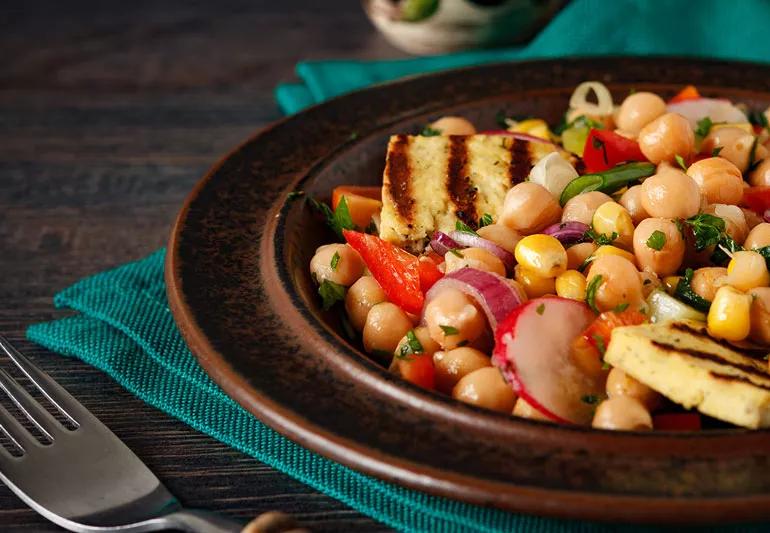Here’s how faux meat products stack up

Image content: This image is available to view online.
View image online (https://assets.clevelandclinic.org/transform/0ef2474d-945b-4535-b682-14bee7efae5e/meatSubstitutesTofuBeans-516425154-770x533-1_jpg)
some meat substitutes are tofu and beans
Veggie burgers aren’t just for vegetarians anymore.
Advertisement
Cleveland Clinic is a non-profit academic medical center. Advertising on our site helps support our mission. We do not endorse non-Cleveland Clinic products or services. Policy
Cruise down the refrigerated and frozen aisles of the grocery store and you’ll see all kinds of packaged meat alternatives, from standard bean-based veggie burgers to “chicken” nuggets to vegan bacon.
There’s also a new generation of faux meat products that are highly processed to mimic the look, flavor and texture of the real thing (some even “bleed” like a burger or piece of steak would).
For anyone who’s looking to pare back their meat consumption, these products can help ease the transition. But just because a product is vegetarian or vegan doesn’t necessarily mean you should think of it as health food that belongs on your plate every day, says registered dietitian Camille Skoda, RDN, LD.
Here’s her advice for picking the best meat substitutes.
While good-quality meat can provide your body with a plethora of different vitamins, minerals and nutrients, plant-based proteins have their own unique set of benefits, Skoda says.
“Having one meatless meal per day, or one meatless day in a weekly, can help you to diversify your diet, add fiber, and include other sources of protein,” she says.
Whole-food sources of plant protein, such as beans, lentils, nuts, seeds and whole soy, provide fiber and prebiotics to help your gut stay health. They also contain sustainable carbohydrates and healthy fats that can help balance blood sugars, Skoda adds.
Studies have also linked plant-based diets with lower risk of cardiovascular disease and other health benefits.
Advertisement
While many packaged meat substitutes are made with healthy, whole-food plant proteins and ingredients, not all of them are. That’s why it’s important to flip over the box and see what’s in one before you buy it.
“Some of these products have added preservatives, sugars, inflammatory oils or other ingredients that we don’t want,” Skoda says.
Before snatching up that meatless chorizo, she recommends considering your personal dietary needs and looking at:
Packaged plant-based products that imitate beef, chicken and pork may be a convenient 1:1 substitute at your next cookout, but there are plenty of other plant proteins that can be easily incorporated into your everyday diet.
Consider swapping out the meat in a recipe for:
Whether you’ve recently cut out meat from your diet or are just trying to eat less of it, plant-based proteins can help fill the void.
Advertisement
Advertisement

Sign up for our Health Essentials emails for expert guidance on nutrition, fitness, sleep, skin care and more.
Learn more about our editorial process.
Advertisement
Pick bell peppers to help fight cancer, memory decline and joint pain
The tropical fruit is a good source of antioxidants and vitamin C
High amounts of cholesterol and saturated fat in red meat may be linked to heart disease
The leaves and pods from this tree are rich in essential nutrients
This starchy root vegetable is a staple in many global cuisines — but it has to be prepared correctly, or it can cause serious concerns
These delicate green sprouts can give you an extra dose of vitamin K and other nutrients — but they’re not safe for everyone
Edamame, lentils and chicken breast are good sources of protein
Eating this root vegetable can help support your eye, heart and brain health
Prioritize your health by managing stress, strengthening your social connections and getting quality sleep
Bolsters, blankets, pillows and blocks can offer extra support, stability and comfort
Allergies, postnasal drip, asthma or reflux could be to blame for a cough that won’t quit